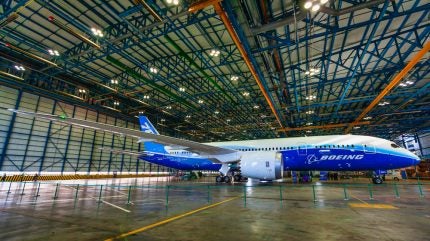
After a catalogue of safety scandals, including a loose external panel and a blown-off door plug, Boeing has achieved an unwanted reputation as a company that needs “to be a heck of a lot better than it currently is.”
That was according to Andrew Charlton, managing director at Aviation Advocacy, who spoke to GlobalData’s Thematic Intelligence podcast this week. Charlton pointed to problems in leadership and a “bean-counter” management model that saw the company cut corners in favour of financial gain.
“Unfortunately, acolytes of [former General Electric CEO] Jack Welch took over Boeing, and they set incredibly challenging profit and free cash flow targets and forced the company to produce financial returns rather than quality aeroplanes. Once that happens, the extra costs you build in for triple checking what you’re doing (and double checking the triple checking) falls away as ‘unnecessary expenditure’.”
Looking to save costs in a state with more lenient labour laws, Boeing opened its South Carolina site in 2011 and took the decision to outsource large swathes of production for the 787 to partners across the world. That was intended to cut production time to fulfil orders faster, but quality control became slack.
While even the best management can’t turn back the clock, Charlton told listeners that he believes the company can – and will – turn things around. However, he said it will require Boeing “to gird their loins, suck up their courage and make a decision on a new airframe”.
“It’s a huge decision, and I’m not disputing that, but it’s worth remembering that in the 50s, and 60s, the original Mr. Boeing bet the company on building the 747, the jumbo jet,” he said. “It was made by people who were prepared to be brave, and it’s that bravery that is going to need to come back.
“Obviously, you don’t want to be stupid-brave, but you want to be real-brave. You want to be sensible-brave. But frankly, Boeing can’t go forward in its civil aircraft area unless they announce and build a new airframe. It’s going to have to include enormously different airframe material to be lighter, it’s going to have to be sort of a generational leap change. It’s probably going to have to incorporate new generation engines, some of which we’re not even sure we know about yet.”
The aviation sector is a duopoly, meaning that Boeing’s need for a new airframe isn’t only about safety – it is also about being competitive, explained Charlton. As of 2023, Airbus’ aircraft orders stood at 2,319, whereas Boeing had 1,456, leaving the company lagging, but still indisputably in demand.
The order book is “falling off”, though, which spells trouble. The existence of at least two serious competitors is essential for maintaining high standards and driving innovation, so Boeing cannot be allowed to fail, Charlton added.
“They’re going to have to gear up enormously and then come to something of an abrupt stop,” he said. “They would be better off focusing on the quality, and pushing their plans out at a more regulated pace.”
Considering the need for new airframes, Charlton said: “The industry is growing at a remarkable rate and so we will need more airframes – I think we will need new generation airframes, not existing generation airframes – and they’ll need to be better and better and better, and they sure as hell aren’t allowed to fall out of the sky.”



